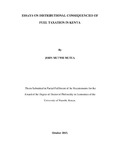| dc.description.abstract | This thesis outlines three topics on residential energy demand and distributional consequences of fuel taxation
for five regulated fuels in Kenya. It provides a comprehensive framework to analyse factors that drive energy
demand and computes the price elasticities of household demand for fuels; distributional consequences of fuel
taxes and estimates welfare losses due to fuel price increases. Lastly, it attempts to provide regulatory policy
options for reducing fuel consumption, distributional consequences and mitigations against welfare losses.
The models of demand for fuels are based on the Linear Approximate-Almost Ideal Demand System (LAAIDS)
in which fuel budget shares are used as dependent variables. The distributional effects are estimated by
use of budget shares and Suit Index while the welfare losses are estimated using the Compensating Variation
(CV) method. The data is obtained from the National Energy Survey of 2009 and other national data sets by
the Kenya National Bureau of Statistics (KNBS). The demand analysis shows that own prices, price of
substitutes, household expenditure, location of household, size of household, gender, education and type of
occupation of the household head are some of the key factors that drive fuel consumption. Elasticity analysis
shows that own price elasticities are negative while the cross price ela.sticities had mixed results depending on
whether a fuel is a substitute or complement. By,,..u..s.9.t of budget shares and t'he Suit Index, this research
establishes that electricity and kerosene are regressive in taxes meaning that the low income deciles bear a
higher burden compared to high income ones. A tax on Liquefied Petroleum Gas (LPG) is however
progressive. With regard to transport fuels, a tax increase, is progressive so that the tax burden is higher for the
high income group than low income ones as is widely held. The essay recommends tax reduction for
regressive fuels while sustaining or increasing cJrrent taxes on progressive fuels. With regard to
compensating variation, low income households would require higher compensation to go back to the same
level they were before the price increases were experienced. With regard to welfare measures by expenditure
deciles, the analysis shows that lower expenditure deciles require more compensation than high income
deciles. Interestingly, higher income deciles require more compensation than the low income deciles in the
case of transport fuels because they directly pay more given their motorization behaviour which is captive
towards private transport and car ownership. In conclusion, although the Government of Kenya is committed
to deregulation, some level of welfare compensation is required and particularly for low income households. | en |

